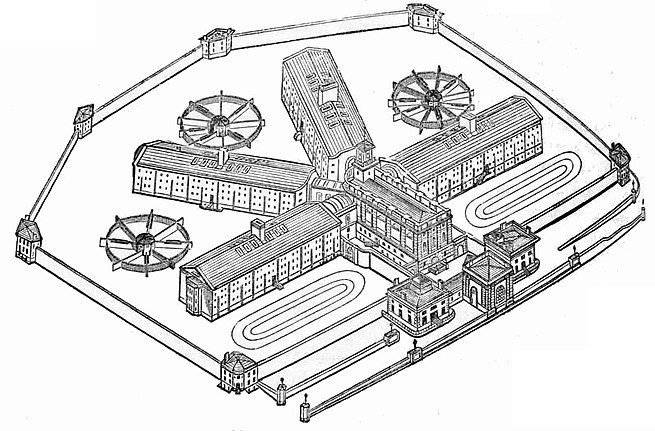
-
Punishment
Punishment is the imposition of an undesirable or unpleasant outcome upon a group or individual, meted out by an authority—in contexts ranging from child discipline to criminal law—as a response and deterrent to a particular action or behaviour that is deemed undesirable or unacceptable. The reasoning may be to condition a child to avoid self-endangerment, to impose social conformity (in particular, in the contexts of compulsory education or military discipline), to defend norms, to protect against future harms (in particular, those from violent crime), and to maintain the law—and respect for rule of law—under which the social group is governed. Punishment may be self-inflicted as with self-flagellation and mortification of the flesh in the religious setting, but is most often a form of social coercion.
The unpleasant imposition may include a fine, penalty, or confinement, or be the removal or denial of something pleasant or desirable. The individual may be a person, or even an animal. The authority may be either a group or a single person, and punishment may be carried out formally under a system of law or informally in other kinds of social settings such as within a family. Negative consequences that are not authorized or that are administered without a breach of rules are not considered to be punishment as defined here. The study and practice of the punishment of crimes, particularly as it applies to imprisonment, is called penology, or, often in modern texts, corrections; in this context, the punishment process is euphemistically called “correctional process”. Research into punishment often includes similar research into prevention.
Justifications for punishment include retribution, deterrence, rehabilitation, and incapacitation. The last could include such measures as isolation, in order to prevent the wrongdoer’s having contact with potential victims, or the removal of a hand in order to make theft more difficult. Of the four justifications, only retribution is part of the definition of punishment and none of the other justifications is a guaranteed outcome, aside from obvious exceptions such as an executed man being incapacitated with regard to further crimes.If only some of the conditions included in the definition of punishment are present, descriptions other than “punishment” may be considered more accurate. Inflicting something negative, or unpleasant, on a person or animal, without authority is considered revenge or spite rather than punishment. In addition, the word “punishment” is used as a metaphor, as when a boxer experiences “punishment” during a fight. In other situations, breaking a rule may be rewarded, and so receiving such a reward naturally does not constitute punishment. Finally the condition of breaking (or breaching) the rules must be satisfied for consequences to be considered punishment.Punishments differ in their degree of severity, and may include sanctions such as reprimands, deprivations of privileges or liberty, fines, incarcerations, ostracism, the infliction of pain, amputation and the death penalty.
Corporal punishment refers to punishments in which physical pain is intended to be inflicted upon the transgressor.
Punishments may be judged as fair or unfair in terms of their degree of reciprocity and proportionality to the offense.
Punishment can be an integral part of socialization, and punishing unwanted behaviour is often part of a system of pedagogy or behavioral modification which also includes rewards.
-
Punishment (noun)
The act or process of punishing, imposing and/or applying a sanction.
-
Punishment (noun)
A penalty to punish wrongdoing, especially for crime.
-
Punishment (noun)
A suffering by pain or loss imposed as retribution
-
Punishment (noun)
Any treatment or experience so harsh it feels like being punished; rough handling
“a vehicle that can take a lot of punishment”
-
Penalty (noun)
A legal sentence.
“The penalty for his crime was to do hard labor.”
-
Penalty (noun)
A punishment for violating rules of procedure.
-
Penalty (noun)
A payment forfeited for an early withdrawal from an account or an investment.
-
Penalty (noun)
A direct free kick from the penalty spot, taken after a defensive foul in the penalty box; a penalty kick.
-
Penalty (noun)
A punishment for an infraction of the rules, often in the form of being removed from play for a specified amount of time.
“A penalty was called when he tripped up his opponent.”
